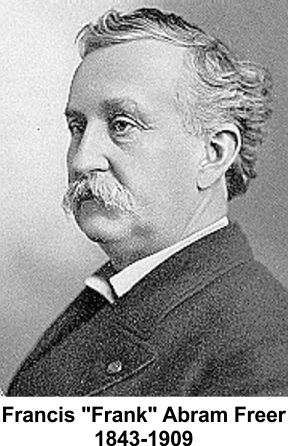|
The Freer family was well known in Galesburg, Illinois,
a city in 1903 of around 20,000 people, 165 miles southwest of
Chicago. Francis "Frank" A. Freer (1843-1909) was
the postmaster there, and his wife of thirty-three
years, Elizabeth "Jennie" Christy Freer (b.1849),
was involved in the Presbyterian church. Their five
children, three boys and two girls, graduated from
Galesburg schools.
In 1903, the Freers spent the Christmas holiday in
Chicago* with the youngest daughter and her husband.
Twenty-six-year-old Alda Mary Freer Henry (b.1878)
and Guy A. Henry (1878-1967),† married in mid1902,
lived at 1198 Wilton Avenue in Chicago. Guy worked
as a clerk for the Chicago branch of
American
School Furniture.
After Christmas, everyone returned to their homes
except Mary's mother, fifty-three-year-old Elizabeth
Jennie Christy Freer (b.1850), who extended her visit with her daughter
for a few more days.
When word of the fire at the Iroquois Theater spread through the city, Guy
Henry cabled the news to his father-in-law, Frank
Freer, that the women had not returned from the
theater. Frank contacted his son,
twenty-three-year-old Morton Freer (1880-1948), who
lived in Rock Island, and both men took trains into
Chicago. They checked in to the Palmer House and
began searching for Jennie's and Mary's bodies.
Joining the search effort were five men, Mr.
Frohlich, John Platt, Major McClelland, Henry Hill
and James Howe. Their relationships to the family
are not known. Frohlich was probably liquor
wholesaler Solomon Frohlich of Galesburg.
Mary's body was found first, on Thursday, the day after the fire. Jennie's
body was not found until two days after the fire, on
January 2, 1904, at Rolston's funeral home. Her body
was identified by Frank. He had spent hours going
through morgues and hospitals, including Rolston's
Undertaking on Thursday, but did not recognize
Jennie then. Though not severely burned, her face
was blackened by soot and blue from suffocation. On
the second visit, he recognized her blouse, a gift
from him. All her jewelry was recovered, having been
retrieved and cataloged by the police department.
She was body #31.
Funeral and burial
Jennie's and Mary's bodies
were sent back to Galesburg by rail in a private
coach donated by Hale D. Judson, superintendent of
Chicago, Burlington, and Quincy Railway (many years
later absorbed into the Burlington Northern
Railway). A group of friends and Odd Fellows club
members from the Veritas Lodge met the train upon
arrival.
In Galesburg, the Kimber &
West funeral home performed embalming and burial
services. A double funeral was held on Monday after
the fire at the
First Presbyterian Church with services conducted by
pastor Dr. William Spence, who had officiated at
Mary and Guy's wedding. Burial was at the Hope
Cemetery in Galesburg.
In attendance at Jennie
and Mary's funeral were many members of G.A.R. Post
45, of which Frank was a member. Many flags in
Galesburg were flown at half-mast and, as the
funeral procession passed down Main St., other
churches in the city added their bells to those of
the Presbyterian.
Freers in happier times
Mary Freer Henry had graduated from the music conservatory at
Knox College in 1900. Her sister, Lizzie Freer
Walker, and two of her brothers, Charles Freer and
Howard Freer, were also Knox graduates. A third
brother, Morton, graduated from another Galesburg
university, Lombard College.‡
|

|

Born in Stark County,
Illinois, Jennie Christy Freer was the daughter of
Alexander and Irena Sheets Christy. While fellow
students at Hedding College in Abingdon, she and
Frank Freer met and became engaged, marrying upon
their graduation in 1871. Frank was the class
valedictorian.

He had served in the Union army in Company D of the 137th Illinois Infantry,
fighting with Forest near Memphis in August, 1864.
After a stint at teaching, and another studying for
the bar, Frank turned to sales, representing an
agricultural equipment manufacturer and a publisher
of text books. They settled in Galesburg in 1875.
In the years after the fire
Guy Henry remarried six years after Mary's death. He became an optometrist,
moved to New York, then settled in Miami, Florida.
Mary's siblings all married and most had children.
Morton C. Freer moved to Minneapolis and followed in
his father's footsteps, becoming a salesman. Howard
A. Freer moved to Chicago and became a chef. Charles
F. Freer worked in the telegraph and telephone
industries.
|
